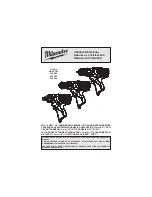
6
ENGLISH
(Original instructions)
This tool is supplied with a double-ended screwdriver bit in the
bit holder (6).
To remove the screwdriver bit from the bit holder, lift the bit
from the recess.
Use
Warning!
Let the tool work at its own pace. Do not overload.
Warning!
the location of wiring and pipes.
easily done before. The battery may become warm while
charging; this is normal and does not indicate a problem.
Warning!
Do not charge the battery at ambient temperatures
below 10 °C or above 40 °C. Recommended charging
temperature: approx. 24 °C.
Note: The charger will not charge a battery if the cell
temperature is below approximately 10 °C or above 40 °C.
The battery should be left in the charger and the charger
will begin to charge automatically when the cell
temperature warms up or cools down.
To charge the battery (7), insert it into the charger (8). The
force. Be sure that the battery is fully seated in the
charger.
Plug in the charger and switch on at the mains.
The charging indicator (9) will blink.
The charge is complete when the charging indicator (9)
switches to continuously on. The charger and the battery can
charger occasionally tops up the battery charge.
Charge discharged batteries within 1 week. Battery life will
be greatly diminished if stored in a discharged state.
Leaving the battery in the charger
The charger and battery pack can be left connected with the
pack fresh and fully charged.
For drilling and for tightening screws, use forward (clockwise)
rotation. For loosening screws or removing a jammed drill bit,
use reverse (counterclockwise) rotation.
To select forward rotation, push the forward/reverse slider
(2) to the left.
To select reverse rotation, push the forward/reverse slider
to the right.
To lock the tool, set the forward/reverse slider into the
centre position.
to set the torque for tightening screws. Large screws and hard
workpiece materials require a higher torque setting than small
screws and soft workpiece materials. The collar has a wide
range of settings to suit your application.
For drilling in wood, metal and plastics, set the collar (3) to
the drilling position by aligning the symbol with the
marking.
For screwdriving, set the collar to the desired setting.
If you do not yet know the appropriate setting, proceed as
follows:
- Set the collar (3) to the lowest torque setting.
-
- If the clutch ratchets before the desired result is
achieved, increase the collar setting and continue
tightening the screw. Repeat until you reach the correct
setting. Use this setting for the remaining screws.






































